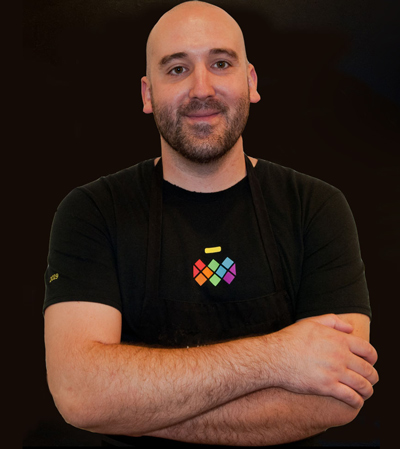“People would rather talk about where their cow comes from”
The late food personality Anthony Bourdain wrote extensively about the bullying, alcoholism and drug abuse he experienced – and celebrated – early in his career as a professional cook. What he described makes for entertaining reading, but not a safe work environment.
 Fortunately, professional kitchens have come a long way since the late 1970s and 1980s. But there’s still a ways to go.
Fortunately, professional kitchens have come a long way since the late 1970s and 1980s. But there’s still a ways to go.
In the first episode of the Career Essentials podcast, we talk to Steven Brochu (Culinary Arts ’06), an Edmonton chef and restaurateur who is doing his part to change kitchen culture and start conversations about mental health.
Brochu is the owner of Milkcrate, a cafe and catering company that he founded in 2019. A year later, in the middle of a pandemic, he launched Milkcrate Listens. It’s an initiative where fellow chefs and others in the hospitality industry can ask questions or share experiences related to mental health.
Listen to Epsiode 1
Listen to the full episode below or read an excerpt. Note: this episode was recorded in December, before the latest public health restrictions that closed most restaurants to in-person dining for the second time in 2020.
Techlifetoday: There’s a lot of research out there that shows mental health is a significant issue for the restaurant industry. Why is that?
The reason why mental health in the hospitality industry is such a big red flag right now is we don’t have the funds to easily access a private therapist or a counsellor. And it’s easier right now for us to grab a six-pack or go to a bar or drugs or anything else – anything else than sitting down in a room on a Monday morning, when you’re hungover, talking to some guy about your feelings.
And, unfortunately, we haven’t trained our staff to know that [talking about it is] an option. It’s starting to come around now. It’s about starting to teach the young cooks coming in that it is okay to be vulnerable and sensitive and be in touch with your feelings and be empathetic towards your fellow chefs and cooks.
“It’s starting to teach the young cooks coming in that it is okay to be vulnerable and sensitive.”
How much of this issue has been influenced by stereotypes of the rebel cook or the punk in the kitchen? Anthony Bourdain romanticized some of the less healthy aspects of the industry. Is that something you’re still having to overcome?
That is a very good question. I love Anthony Bourdain. I read Kitchen Confidential. It got me into cooking. It got me into the industry. I thought, “This is rock and roll. This is cool,” especially as a young teenage boy in a home-ec. class learning that what I’m doing here in this foods lab can actually translate into me drinking beers on top of 30 Rock in New York. That’s cool, right?
“Anthony Bourdain was a failed chef and the things he did and romanticized led him to ruin.”
Anthony Bourdain was a failed chef and the things he did and romanticized led him to ruin. It did lead him to becoming a great author and reporter and travel expert, but not a chef. And people get lost in that message.
It is getting better and there are chefs now that are coming forward and changing their culture – especially chefs that knew Bourdain, which is important. The [David] Changs, the [Eric] Riperts, they’re coming out and saying, it’s OK to cry, it’s OK to have all these things happen to you.
What led you to create Milkcrate Listens?
I wanted to start Milkcrate Listens because I wanted to create an opportunity for people in our industry to talk. And the reason why I did it is no one was. There isn’t a hotline for chefs.
A lot of the mental health information out there is geared towards a generic audience, which is normally a nine-to-five group of people – and that’s fine – but there isn’t a poster for, “I just broke up with my girlfriend last night, I’m on the fryer tonight, the guy before me didn’t close down the station correctly, I’m out of this stock, the chef is yelling at me, oh my gosh my parents are coming in town tomorrow.” Like, where is that poster? And how do you tell an 18-year-old that just came out of high school how to process those emotions or that those emotions are all OK?
What’s stopping some of those larger restaurant groups from taking this issue more seriously?
To be fair, some of them have posters up and there are conferences that they’ll send management teams to … but is it enough? Another huge thing is some people don’t think there’s enough time. There’s not enough time to invest in just talking to my staff and understanding where they’re coming from.
“People would much rather spend more time concerning themselves about where their cow was coming from …”
People would much rather spend more time concerning themselves about where their cow was coming from – which is fine, you should be worried about where your food’s coming from. But also, you should be worried about where your people are coming from. If you got a guy that’s going through a divorce right now, it is in your best interest to understand what he’s going through and how you can help him so he can help you execute your dinner service.
Subscribe to Career Essentials
Subscribe to Career Essentials at Apple Podcasts, Spotify, Stitcher or wherever you get your podcasts.